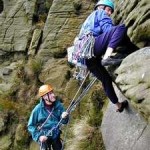Today’s workers are being asked to do more with less, to reach higher goals with fewer resources and in less time. You understand the need, you want to say “yes” and mean it, but you say “yes” with uncertainty and doubt. What’s going on? How come you can’t authentically say yes to climb the mountains at work, like higher sales quotas and on-time, on budget product launches.
Pop Quiz: Who would be your climbing partner: Person A or Person B?
| Person A says … | Person B says … |
|
|
|
|
|
|
How come people who know zero about mountain climbing easily choose Person B? Perhaps it’s because when physical safety literally hangs in the balance, we easily recognize that speaking with a commitment to eliminate uncertain and to reduce risk of injury becomes the #1 priority.
How come what’s clear on the real mountain gets fuzzy on the metaphorical one, the workplace? Perhaps it’s because the injuries that can be sustained in a metaphorical “office fall” don’t require stitches. They can, however, break trust, crush a career, and even kill a dream.
How much time and energy do you waste fuming about other people not keeping their promises to you? If you said “None”, I bet you’re on a desert island. Or, “Some”, I might guess that you have few expectations of others. Or, “Way Too Much”, my guess is that you’re like most whose work requires effectively coordinating with lots of people.
Working effectively with others is a complex undertaking. Here’s one practice that can reduce the fuming and increase performance. I call the practice “committed speaking and listening”. (Details on programs that teach this and other business skills at https://wipcoaching.com/programs/.)
Nice vs. Necessity

Climber: “On belay?” Belayer: “Belay on.” Climber: “Climbing.” Belayer: “Climb on.”
This language and the matching committed actions must be mastered to fulfill a fundamental commitment of successful climbing– come home unharmed. It’s a language of personal and partner accountability.
Climbers are not offended by the question, “On belay?” The climber doesn’t say to herself, “Well, duh, I’m the one climbing; she should be belaying me, so why ask? What else is she doing anyway?” Or, “Will he think I’m bossy if I ask if the belay is on? Will he think I don’t trust him? The belayer is not muttering under her breathe, “I said ‘Belay on’, what’s up with her saying she’s climbing? I know that, already!”
It’s not nice to be certain and clear if you are climbing Yosemite’s El Capitan, it is a necessity to surviving.
Words that hold both ends of the Accountability Rope
Physical safety is not a concern for most workers. Our goals are more in line with getting opportunities for advancement, being recognized and rewarded for our contribution, feeling like what we do matters and has a purpose. Achieving these goals depends on how often we say “x” will happen, and “x” happens and on our individual and collective levels of accountability.
Climb into your workspace and listen to the language of your team. What do you hear? In many of the organizations I consult, in the beginning, I hear “we’ll see …; let’s hope…; maybe …” It fascinates me how often the language of certainty and clarity are missing – and missing that it’s missing! (BTW: the language changes as we work together.)
There’s a language, a jargon, that creates accountability. It sounds like this:
Requestor: “Please email me the complete list by 3:00pm Wednesday.” (On Belay?)
Promisor: I will and I understand a completed list includes x and z. Is that right? (Belay on.)
Requestor: Yes. (Climbing)
Promisor: I will. (Climb on.)
When someone makes a promise to you, you become their partner in fulfilling it. When they say, “I promise to give you the report by this Thursday, 3:00pm” and you say: “OK”, you become the committed listener. When Thursday, 3:05pm comes and the report is not delivered, your commitment is to contact them and find out what’s up.
Shouts from the peanut gallery (thou doth protest too much)
“How come I have to follow them up? Why don’t they just do what they said? And why don’t they contact me with the ‘what’s up’? It’s her promise, not mine! I’ve got plenty of my own promises that I have to keep. I can’t take the time to track everyone else’s, too!!”
| Two ends to the accountability rope: committed speaking & listening. Both must be upheld if you want to make it to the next mountain top and beyond. |
What I am advocating is a way to cut through the noise that squashes productivity: Replace the time and energy spent on blaming others or wondering what’s happening with a practice of committed speaking and listening. This practice will allow you to determine the appropriate level of trust to have with specific people in specific areas (yes, there are levels of trust, not one-size-of-trust-fits-all), and it gives you a way to build accountability where it is missing.
Regardless of which mountain you are climbing, speaking the language of commitment is essential for success. Rather than rely on luck or hope, hold up your end of the rope with timely follow through and compassion for the human being holding the other end. The more you do, the more mountain tops you’ll reach. Climb away!
Subscribe
Get Camille's latest posts!
